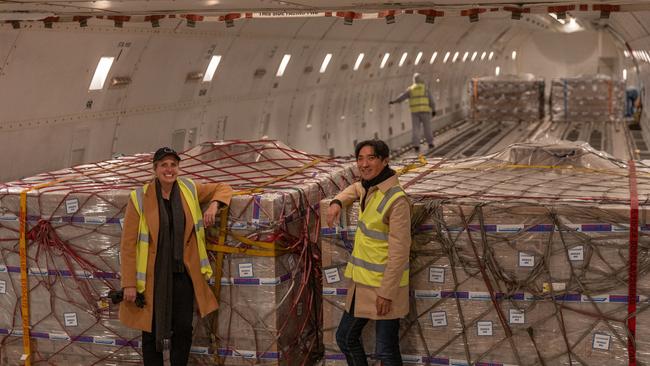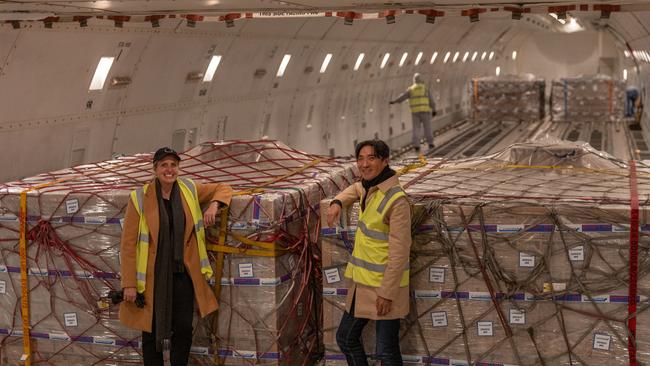Senior China staff sacked as Bubs cull widens amid stoush with CEO Kristy Carr
Bubs was the toast of the Oval Office last May, adding $130m of market value in a month. As its fortunes unravelled, China became the sore point.

As a boardroom drama was beginning to unravel at Bubs, three senior employees based at the company’s China office were sacked.
The job losses were the first casualties of a strategic review that Bubs’ board had commissioned into its China business. Late last month, Bubs new chair Katrina Rathie — who succeeded a recently demoted Dennis Lin, announced that Jackie Lin would complete the review “effective immediately” to help turn the company around.
Bubs’ latest quarterly results were not pretty. Revenue had dived 10 per cent to $15.8m — and its China sales plunged 56 per cent, with “significant amounts of finished goods inventory held in trade”.
Adding to the weak result was Bubs’ shares, sliding more than 45 per cent in the past year to 20c.
Jackie Lin has been seconded from Alibaba-backed private equity firm C2 Capital, which also owns more than 10 per cent of Bubs.
Those say Mr Lin — not to be confused with Dennis Lin or C2 Capital’s representative on Bubs’ board Steven Lin — has been hired because of his deep insight into the China market.
But some shareholders say his appointment is a clear conflict of interest and at worst represents the start of a potential takeover by stealth from C2 Capital and Alibaba, without Bubs paying shareholders a premium.
“It doesn’t make sense to me for any company to feel that it is correct that you get an Alibaba ex-employee investigating the China strategy. Is that not skewed? It’s almost like getting Woolworths to do a review of Chemist Warehouse — it’s not very impartial,” said one shareholder who declined to be named.
The sentiment — shared by several other shareholders which spoke to The Weekend Australian — underscores the tensions that have erupted inside Bubs after co-founder and former chief executive Kristy Carr was “terminated” from her role this week for breaching board directives.
Her ousting came a month after Dennis Lin was demoted from his role of executive chair and amid reported differing opinions on the companies China strategy.
Under Carr and Dennis Lin’s leadership, Bubs was pursuing an omnichannel approach, including producing infant formula in China to gain access to bricks and mortar outlets — such as mother and baby stores — which represent about 80 per cent of the country’s $40bn infant formula market, and compete with online retailers such as Alibaba.
The sacking of Ms Carr — who declined to comment for this article — and Dennis Lin’s demotion appears to have the hallmarks of a boardroom coup.
Bubs — which also didn’t comment for this article — rejects this. It also rejects fears that Alibaba is seeking to take over the company via C2’s shareholding.
The thinking at the company is that Ms Carr undermined the board by seeking to meet shareholders and suppliers during the past month while she was on sick leave, while Dennis Lin’s departure from executive chair was a move to enhance governance by splitting the executive from the board.
The problem for Bubs’ new chair, Ms Rathie, is that Bubs’ brand has become synonymous with Ms Carr — who has all her wealth tied up in the company she founded with Anthony Gualdi, owning almost 2 per cent of its stock.
Strong founders can present a dilemma for companies as operations grow and become complex, creating potential governance issues and tensions in the boardroom. Just look at the showdown that engulfed Blackmores two years ago.
But as late as April 28, Ms Rathie still had the door open for Ms Carr. “The board currently expects Ms Carr to return in mid-May,” the company said during its quarterly earnings statement.

With Dennis Lin — who she described as her mentor — Ms Carr struck a double act, which managed to charm the US last year. Bubs became one of the first Australian companies allowed to import infant formula to America to help solve a chronic national shortage.
Ms Carr shared a stage with US President Joe Biden, who declared: “I’ve got more good news: 27.5 million bottles of safe infant formula manufactured by Bubs Australia are coming to the United States”. The operative word was “safe”.
Bacterial contamination concerns forced a shutdown of major American manufacturer Abbott, which sparked the US’s infant formula shortage. It reflected a similar crisis 14 years ago when Chinese infant formula was contaminated with melamine, killing six babies and putting another 54,000 in hospital.
The China infant formula market was never the same after the scandal — sparking a so-called ‘‘white gold rush’’ as Chinese parents turned to foreign brands, enriching A2 Milk and Bellamy’s and paving the way for Bubs’ ASX listing in 2017. Bubs investors hoped a similar scenario would play out in the US on the belief that parents would lose trust in Abbott.
Bubs shares surged 35 per cent, adding $130m to its market value, within a month of Mr Biden’s comments.
But it wasn’t to last. While Bubs has since managed to be stocked in more than 7000 stores — including Walmart, Kroger and ABSCO — its share price has steadily declined, and its China business is yet to recover from the pandemic.
Group expenses meanwhile leapt 74 per cent in the three months to March 31, compared with the same quarter in 2022, but had fallen 10 per cent from the December quarter.
When delivering its latest earnings, the company also announced that Paul Jensen and Reg Weine had been appointed to its board as independent non-executive directors. “Immediately following the outlined governance changes, the board commenced a strategic review of the business, with a particular focus on the US, Australia, and China operations,” Bubs said.
Ms Rathie said at the time: “Expenditure management is an immediate focus of the board”.
Several investors say they still have faith in Bubs’ strategy, saying it will take time to lift earnings.
“Bubs is still a small, emerging business,” said another shareholder, who declined to be named.
“That’s the reality of it. They haven’t taken that quantum step up to the level of being a very significant business with significant resources, so every dollar of resource goes straight back into the business.
“I understand, as a shareholder, they need to keep investing. I would be concerned if they took their foot off the business development, brand development pedal.”






To join the conversation, please log in. Don't have an account? Register
Join the conversation, you are commenting as Logout